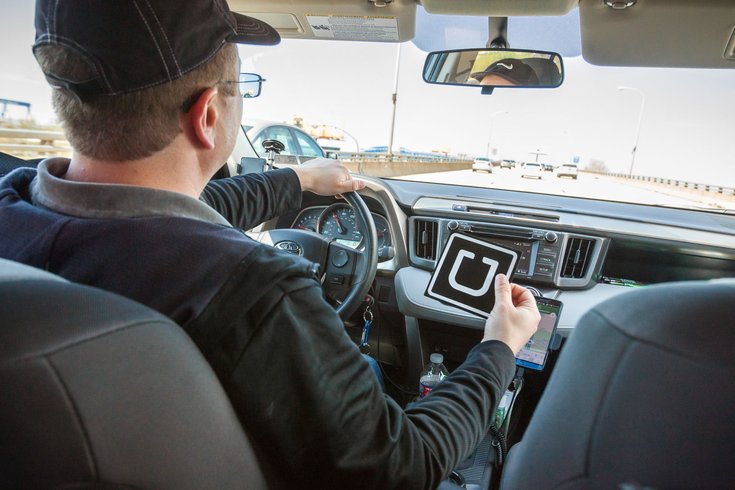UberX recorded its millionth ride in Philadelphia earlier this month, a milestone the ride-sharing service hit less than six months after its late October debut.
As far as the Philadelphia Parking Authority is concerned, each of those rides was illegal. So, too, were any rides provided by Lyft, a similar ride-sharing service that launched in January.
- COMING TUESDAY
- Three of our intrepid reporters spent a recent day riding UberX, Lyft and taxis all over the city and South Jersey. We compare the three ride services and tell you which respond quickest and get you to your destination fastest – for the cheapest fare.
Yet, the advent of UberX and Lyft is reshaping Philadelphia’s transportation service industry, creating a Wild West environment where authority is ignored as competition rises. Despite the efforts of the PPA, which has fined drivers and impounded cars, the ride-sharing services do not appear to be leaving Philadelphia any time soon.
UberX and Lyft, which are operated by nonprofessional drivers using their own vehicles, provide rates that are generally cheaper than taxis, limousines and Uber’s BLACK service, an upscale vehicle driven by a professional chauffeur.
"People in Philadelphia were really looking for more transportation options on the ground, more low-cost, reliable ways to get around.” – Jon Feldman, general manager, Uber Philadelphia
Users request rides via a phone app, which displays the driver’s name, vehicle and estimated arrival time. The app also handles payment, charging the passenger’s credit card.
These services have been a hit, according to Uber and Lyft officials. And the Philadelphia market apparently is lucrative enough for the companies to pick up any PPA fines or impoundment costs incurred by their drivers.
“People in Philadelphia were really looking for more transportation options on the ground, more low-cost, reliable ways to get around,” said Jon Feldman, general manager of Uber Philadelphia. “We expected there to be demand, but clearly there is a tremendous amount of demand from across the city, which really reflects the dearth of other options that existed.
While UberX and Lyft operate unauthorized in Philadelphia, they are free to operate throughout the rest of Pennsylvania without issue.
The Pennsylvania Public Utility Commission granted UberX and Lyft temporary licenses to operate in the state’s 66 other counties, where the PUC governs taxi and limousine services.
“UberX and Lyft are both illegal taxi services that use an app to connect people looking for rides with private citizens willing to use their own vehicle as a commercial taxi.” – Vince Fenerty, PPA executive director
The PPA regulates those services in Philadelphia, where medallions are necessary to operate taxi services. It has taken a hardline stance against the ride-sharing services, pledging to enforce the existing medallion system until legislators draw up regulations governing ride-sharing services.
“UberX and Lyft are both illegal taxi services that use an app to connect people looking for rides with private citizens willing to use their own vehicle as a commercial taxi,” PPA Executive Director Vince Fenerty said in a statement to PhillyVoice. “Unlike the 1,600 licensed medallion cabs in the city, there is no guarantee these cars are clean, safe, inspected or insured. Their drivers have no training and have not gone through extensive driving or criminal background checks."
Both Uber and Lyft officials said their drivers must pass criminal background checks, own auto insurance and meet various vehicle stipulations. Both companies also cover drivers with $1 million liability insurance policies.
Still, Uber and Lyft officials spoke carefully when asked about the decision to operate unauthorized in Philadelphia, steering the conversation to the legislation needed to authorize the services.
“What we’re really focused on now is finding a solution that includes Philadelphia,” Uber spokesman Taylor Bennett said. “To exclude a city like that — that has a very clear demand for UberX — simply hurts consumers who rely on it everyday.”
'UNFAIR PLAYING FIELD'
In January, City Council adopted a resolution urging state lawmakers to authorize UberX and Lyft within the city, saying it is discriminatory to exclude Philadelphians from services available to the rest of the state.
That may be true from a legal standpoint. But, practically, Philadelphians are far from excluded.
And taxi drivers have cried foul, claiming UberX and Lyft are illegally siphoning their business.
Ronald Blount, president of the Taxi Workers Alliance of Pennsylvania, said UberX and Lyft have oversaturated the market, essentially turning cab jobs into part-time work.
“On the slow days, the taxicabs aren’t making money,” Blount said. “Some of them are jumping over to drive UberX. Some of them are just staying home.”
For decades, drivers have needed a medallion to operate a taxi service. The arrival of ride-sharing services has undermined the livelihood of those cabbies who paid for medallions to legally pick up fares.
“Now, with these other companies, you have an unfair playing field,” said David Alperstein, executive director of the Greater Philadelphia Taxi Association. “That’s really the key here. If you level the playing field, I think you’re going to have a great industry.”
The ride-sharing services are also costing the city money.
The cost of medallions, once as high as a half-million dollars, has plummeted since Uber and Lyft starting doing business in Philadelphia. A recent PPA auction for the rights to operate new taxis designed for the disabled, for example, generated no interest. When no buyers showed up for the original asking price of $475,000, the price was slashed to around $50,000 under a new auction process announced in February. That sale of 46 new medallions is set to begin in May.
In addition to the PPA, cab companies are also striking back. Forty-five taxi companies in Philadelphia filed a federal lawsuit against Uber in December, alleging the company conspired to operate a taxi service without obtaining necessary medallions. The suit remains active, but a judge denied a preliminary injunction that would have halted UberX operations during the legal proceedings.
'PEOPLE JUST NEEDED MORE WAYS TO GET AROUND'
The PPA coordinated sting operations when UberX launched in late October and again when Lyft debuted in late January. The PPA had impounded 52 vehicles as of last week.
Yet, the PPA’s enforcement has had little impact on either service.
More than 6,000 UberX drivers operate throughout the Philadelphia region, a figure Uber claims has boosted the scope of ground transportation to include various underserved areas.
More than half of all UberX rides arrive within 4 minutes, according to Uber. The ride-sharing service says 87 percent arrive within 10 minutes.
“That’s what makes it so successful and reliable throughout the city,” Feldman said. “Uber partners live everywhere and can go online wherever they are and whenever they want.”
UberX says it has been particularly popular among the weekend bar scene.
More than 53 percent of UberX trips originate between 11 p.m. and 3 a.m. in city areas with high concentrations of bars — Rittenhouse, University City, Midtown Village, Old City, Washington Square, Fishtown and Northern Liberties, it said.
Lyft brings a more casual atmosphere to the industry, encouraging passengers to ride in the front seat, control the music and engage in conversations with drivers. Its cars are adorned with an iconic pink mustache.
Lyft has not publicly released statistics detailing its drivers and passengers. But spokeswoman Chelsea Wilson says Lyft has hundreds of drivers in Philadelphia. She described the company’s initial reception as “enthusiastic.”
“It’s something that people really wanted in the city,” Wilson said. “Philadelphia was a city where people just needed more ways to get around. It was a particularly challenging city when it came to the existing transportation options that were there.”

 Thom Carroll, File/PhillyVoice
Thom Carroll, File/PhillyVoice